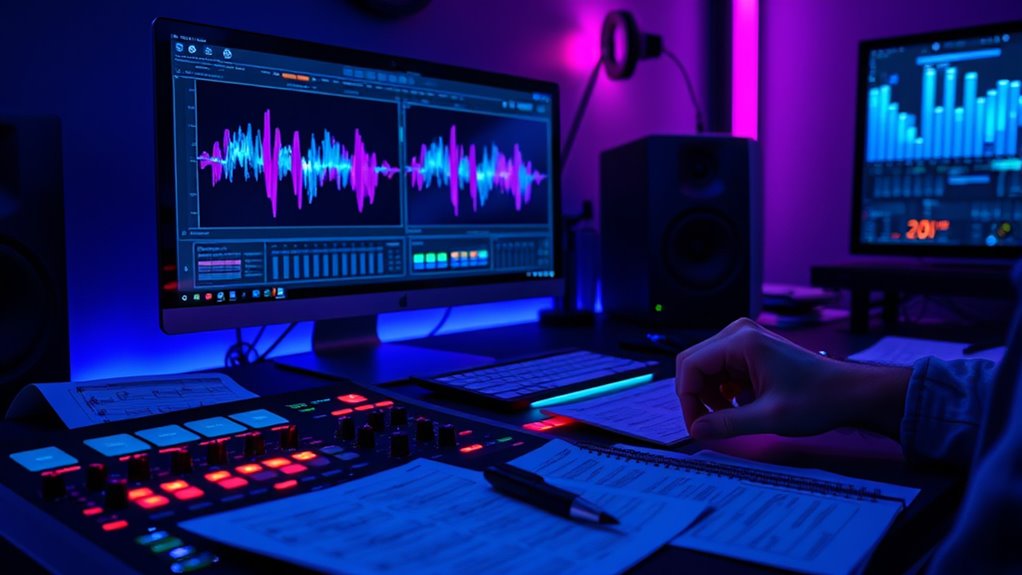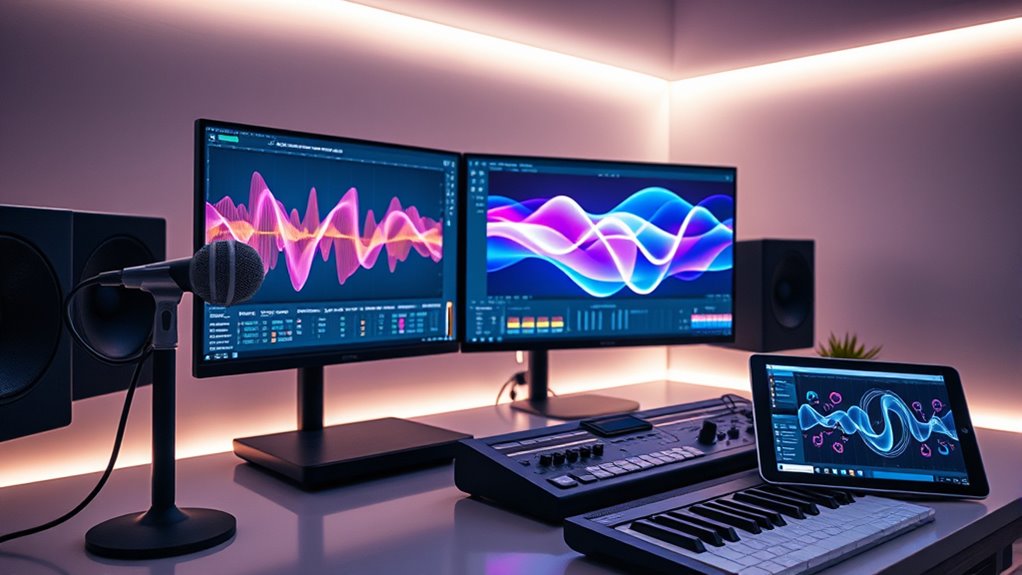Using generative AI, you can quickly produce diverse, high-quality music tracks without extensive skills or equipment. This technology analyzes large datasets to create authentic melodies, allowing you to tailor compositions and generate variations easily. You can license your tracks through stock platforms or create exclusive deals, generating passive income. AI also makes scaling your music catalog straightforward, boosting your chances for continuous revenue. Keep exploring how these tools can help you unleash new licensing opportunities and grow your music business.
Key Takeaways
- Use generative AI tools to rapidly create diverse, high-quality music tracks for licensing to content creators and media producers.
- License AI-generated music through stock platforms, offering options for standard, exclusive, or subscription-based access.
- Enhance discoverability by tagging tracks with metadata, making it easier for buyers to find and license suitable music.
- Scale your music catalog efficiently, continuously producing new variations and styles to meet market demand and increase revenue.
- Leverage AI’s adaptability to stay current with trends, tailoring compositions for specific client needs and licensing opportunities.

With advances in generative AI, producing original music has become faster and more accessible than ever before. You no longer need extensive musical training or expensive equipment to craft compelling compositions. Instead, AI generated melodies allow you to generate diverse, high-quality pieces with just a few inputs. These algorithms analyze vast datasets of existing music to create new melodies that sound authentic and engaging. As you experiment with different prompts and parameters, you can produce a variety of tracks tailored to specific moods, genres, or styles. This democratization of music creation empowers you to build a versatile catalog without the traditional barriers.
Once you’ve developed a collection of AI-generated melodies, licensing becomes a key step to monetize your work. Licensing revenue models offer multiple avenues for earning income from your compositions. For example, stock music platforms provide a straightforward way to license your AI-created tracks to filmmakers, advertisers, and content creators. When someone uses your music, you receive a fee or royalty, creating a passive income stream. Alternatively, you can establish exclusive licenses with clients who want unique, tailor-made tracks, commanding higher fees. Some artists also explore subscription-based models, where users pay a regular fee to access your library of AI-generated music. This approach maximizes your earning potential by offering ongoing value to subscribers.
Monetize your AI melodies through licensing, royalties, exclusive deals, and subscription models to maximize income and reach a global audience.
The beauty of using AI in music licensing is that it simplifies the process of producing a large volume of tracks, enabling you to meet high demand without sacrificing quality. You can rapidly generate variations of a melody or create entirely new compositions to diversify your portfolio. This flexibility allows you to adapt quickly to market trends or client needs, increasing your chances of securing licensing deals. additionally, AI tools often include metadata tagging and search functionalities, making it easier for potential buyers to discover your music. By effectively marketing your AI-generated melodies through licensing platforms, you can tap into a global audience and build a sustainable revenue stream.
In essence, leveraging AI to produce music and sell licenses transforms the traditional creative process into a scalable, efficient business model. You get to focus on refining your sound and expanding your catalog while AI handles the heavy lifting of composition. With the right licensing revenue models in place, your AI-generated melodies can generate consistent income, providing you with financial stability and creative freedom. As these technologies continue to evolve, your ability to innovate and monetize your music will only grow, opening up exciting new opportunities in the digital music landscape.
Frequently Asked Questions
How Do Licensing Rights Differ for Ai-Generated Music?
When licensing AI-generated music, you need to understand that copyright ownership often depends on who created or programmed the AI. Licensing agreements may specify whether you hold rights or need permission from the AI developer. Unlike human-created works, rights can be shared, transferred, or limited, so you must carefully review the licensing terms to make certain you have proper permissions, especially if you’re selling licenses or distributing the music.
Can Ai-Produced Music Infringe on Existing Copyrighted Works?
Yes, AI-produced music can infringe on existing copyrighted works, leading to copyright disputes. If the AI generates music that closely resembles or copies protected material, you could face legal challenges. Creative ownership also becomes complex, as determining who owns the rights—whether the AI developer, user, or original creator—can be unclear. Always guarantee your AI-generated music is original and respects existing copyrights to avoid legal issues.
What Are the Ethical Considerations for AI in Music Creation?
You should consider AI bias and creative ownership when using AI in music creation. AI bias can influence the diversity and fairness of the music generated, potentially perpetuating stereotypes. Meanwhile, questions of creative ownership arise over whether you or the AI hold rights to the work. Ethically, you must guarantee transparency about AI involvement and respect intellectual property rights, fostering fair, inclusive, and responsible music production.
How Can Artists Ensure Fair Compensation From Ai-Generated Content?
To guarantee fair compensation from AI-generated content, you should actively manage royalties through transparent royalty management systems that track usage accurately. Stay informed about fair use policies and ensure your licensing agreements clearly define usage rights. By maintaining control over licensing terms and monitoring AI-generated work’s use, you safeguard your earnings and uphold your rights in this evolving landscape.
Are There Legal Restrictions on Selling Ai-Created Music Licenses?
Yes, there are legal restrictions on selling AI-created music licenses due to copyright concerns and licensing challenges. You need to confirm you have rights to the AI-generated content and avoid infringing on existing copyrights. Laws vary by jurisdiction, so you should consult legal experts to navigate licensing rules properly. Failure to do so could lead to legal disputes or invalid licenses, so stay informed and clear about ownership and licensing terms.
Conclusion
As you explore using generative AI to create music, you might find it’s not just about automation but revealing new creative horizons. Suddenly, you realize that licensing this AI-produced music could become your next big opportunity, blending innovation with commerce. Coincidentally, as you embrace this technology, you discover that what started as a tool now feels like a partner in your journey. In this dance of creation and commerce, your future in music feels more promising than ever.









